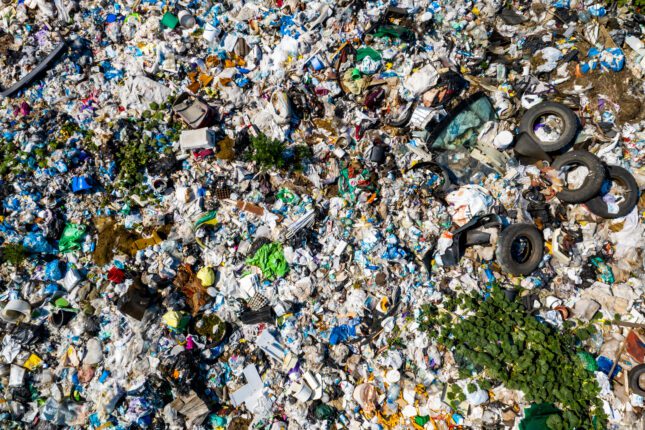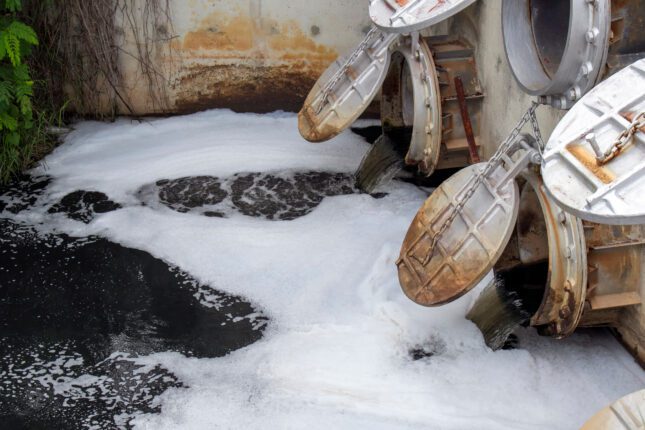-
Will the Global Plastics Treaty Safeguard Health?
›August 13, 2025 // By Dr. Philip J. Landrigan
Global plastic production is increasing almost exponentially. Not only has it grown 250-fold since the 1950s, but it is on track to double by 2040, and nearly triple by 2060. The waste associated with its creation has accumulated in parallel. An estimated 8 billion metric tons of discarded plastic now pollute the planet, breaking down into micro-and nanoplastic particles (MNPs) that are ubiquitous in the environment.
-
Toxic Threads: Southeast Asia’s Textile Pollution Poses a Growing Security Threat
›August 11, 2025 // By Md Mursalin Rahman Khandaker
In today’s world of fast fashion, a $4 crop top travel across continents faster than a letter, and new trends die before a customer hits the “checkout” prompt. Yet the global obsession with cheap clothing creates apparel soaked in a cocktail of dyes, plasticizers, and forever chemicals, that linger far longer than the consumer forces that make them trendy.
The global apparel sector is valued at over $1.8 trillion, and it is the world’s second most chemical-intensive industry after agriculture. For big manufacturing hubs in Southeast Asia (particularly India, Bangladesh, Pakistan), textiles represent an economic lifeline.
-
From Waste to Wear: Chinese Startup Revolutionizing Sustainable Fashion with Recycled Materials
›China Environment Forum // Guest Contributor // waste // March 13, 2025 // By Yunhuan Chen, Haiying Lin & Haifeng HuangIn December 2024, the Global Plastic Treaty delegates kicked the plastic bottle down the road, delaying a final agreement to rein in the plastic pollution plaguing the planet. Recycling has failed to solve the problem, with most single-use plastic waste ending up in landfills (50%), incinerators (19%) or leaked into the environment (22%). Ultimately, the world needs to produce significantly less single use plastics and more reusable packaging. There is also a need to create better technologies and policies to push companies to transform plastics into new products.
-
ECSP Weekly Watch | January 20 — 24
›
A window into what we’re reading at the Wilson Center’s Environmental Change and Security Program
Placing Water at the Heart of Climate Action (Relief Web/Netherlands Red Cross)
It may be true that water is life. But equally true is that roughly 90% of natural disasters—and the havoc they wreak—are water-related. A recognition that these disasters are intensifying in a warming world has led the Netherlands Red Cross to create Water at the Heart of Climate Action (WHCA): a program to tackle the intertwined crises of water-related disasters and climate change.
-
When Going in Circles is a Virtue: “The Circular Economy”
›
As an economic model that emphasizes the continual use of resources by rethinking waste and product design and promoting a shared economy mindset, the “circular economy” (CE) now resonates across a wide range of stakeholders—including key players in the private sector, major environmental groups, individual countries, multilaterals, and donors. Yet progress in adopting CE among developing nations has been slow and uneven.
-
ECSP Weekly Watch | November 4 – 8
›
A window into what we’re reading at the Wilson Center’s Environmental Change and Security Program
Can Fighting Smog Be a Bridge in India-Pakistan Relations? (Al Jazeera)
The Swiss group IQAir has compiled and analyzed data from 14 regional monitoring stations and declared Pakistan’s capital Lahore to be the world’s most polluted city. Last Wednesday, for instance, Lahore’s air quality index (AQI) score was 1165, which then increased in a staggering fashion to 1900 AQI by the following Monday. India’s capital, New Delhi, was a close second for most-polluted city in the same survey, however. This cross-border pollution issue now has led government officials in both countries to reignite stagnant relations to pursue solutions.
-
ECSP Weekly Watch | September 9 – 13
›
A window into what we’re reading at the Wilson Center’s Environmental Change and Security Program
Fukushima Nuclear Clean-up Begins (The Diplomat)
It has been over 13 years since a massive 9.0 earthquake near the coastline of Japan in 2011 triggered a tsunami that irreversibly damaged the Fukushima Daiichi nuclear plant. Failing cooling systems within the plant led to the melting of its radioactive core reactor, which dripped toxic fallout across the plant and in the larger ecosystem. Since that catastrophe, Japan has been devising ways to responsibly clean the waste in Fukushima—and it might be getting closer to a final answer.
-
ECSP Weekly Watch | August 26 – 30
› A window into what we are reading at the Wilson Center’s Environmental Change and Security Program
A window into what we are reading at the Wilson Center’s Environmental Change and Security ProgramWorld Food Program Faces Scrutiny Over Fraud in Sudan (Reuters)
As Sudan suffers an immense humanitarian crisis due to an ongoing internal conflict between the Army Forces and the paramilitary Rapid Support Forces (RSF), the U.N. World Food Program (WFP) has provided crucial aid to people displaced by the conflict. Yet its ability to continue this crucial work is now under threat because of allegations of illicit activities made against its top officials in that country. These developments have drawn the attention of humanitarian practitioners and diplomats—who also have concerns regarding WFP’s mismanagement and how it might have contributed to the failure to deliver enough aid in Sudan.
Showing posts from category pollution.










